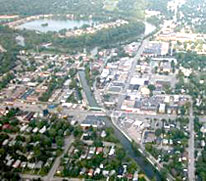
|
Broad Ripple Random Ripplings

The news from Broad Ripple
Brought to you by The Broad Ripple Gazette
(Delivering the news since 2004, every two weeks)

|
| Brought to you by: |

|

|

|

|

|

|
Converted from paper version of the Broad Ripple Gazette (v04n22)
BRVA Town Hall Meeting focuses on property tax issues - By Ashley Plummer
posted: Nov. 02, 2007
The Broad Ripple Village Association (BRVA) held their seasonal town hall meeting on Tuesday, October 16, 2007, at the Indianapolis Art Center where the central focus of the night was the property tax crisis.
Addressing the issue to a nearly filled auditorium were numerous area officials, including Washington Township Assessor Joline Ohmart, District 3 Councillor Ryan Vaughn, Baker and Daniels tax expert Ron Gifford, State Representative David Orentlicher and Deputy Mayor Steve Campbell.
David Hoppe, associate editor of Nuvo, was also present to act as the evening's discussion moderator.
The night opened with an informative slide show presented by Gifford entitled "property taxes 101" (the presentation was actually called "The Property Tax Crisis: what do we know and where do we go").
Gifford's presentation went through the basics of exactly what led to the dramatic rise in the yearly property tax bill that homeowners received in the early summer months this year.
"I want you all to know that I am here strictly as a messenger," he said. "I am a property tax payer as well. This is just an outline of how we came to be where we are today with our property taxes."
Gifford continued by explaining exactly how property taxes are assessed and that the reason the rates rose this year was due to a decision made by the Supreme Court to re-evaluate real property values in Indiana this year.
He also pointed out that, due to a decision made by the Indiana General Assembly to eliminate inventory taxes from businesses, there was a major shift in the state's tax burden from business owners to residential owners.
"Is it possible to abolish property taxes?" Gifford asked. "Well, that is the 6 million dollar question."
(Note: this meeting took place prior to Indiana Governor Mitch Daniels proposal that promises to deliver $1 billion in property tax relief by 2009, mainly by raising the sales tax by one percent and shifting to the state a large burden of school operations).
However, after Gifford and the others spoke, leaving the floor open to questions from audience members, one of the first questions read by Hoppe was: "Why can we not just abolish property taxes?"
A few of the speakers answered the question by noting that if property taxes were abolished in their entirety, taxpayers would still feel the burden in other areas-specifically in their income taxes and sales taxes.
"What would happen," Gifford said, "is that almost any option eliminating taxes would be great for the property rich and income poor, but extremely harsh on everyone else, specifically the income-rich and property-poor."
State Representative David Orentlicher (D-Indianapolis) also spoke up at the meeting about a new proposal he drafted that would include $400 million in immediate savings for taxpayers by transferring child welfare and other local costs to the state budget.
"We have money for these things in the state budget," he said. "By absorbing several areas of spending into the state budget, there will be better oversight to limit future increases in (local) spending."
However, quite possibly the most interesting thing about this meeting was that it took place right around the same time that most Marion County taxpayers received their up-to-date bill in the mail, which included a letter from Michael W. Rodman, treasurer of Marion County.
The letter noted that the bill being received by the taxpayer was the second of three installments.
While there are usually two payments, due to the state's reassessment, there will be a third payment due sometime in April of 2008.
Rodman noted that, as a result of this third payment, he is asking the state to delay the first 2008 payment that will normally be due May 10.
Other questions of the night revolved around the need for so many local governments, including nine school boards and numerous townships.
Deputy Mayor Steve Campbell took on this inquiry by highlighting that while the city has realized there is a need for the individual school boards ("each school district is different"), he said that the city is definitely looking at ways to minimize the amount of local governments.
Gifford's presentation can be viewed online here: http://www.discoverbroadripplevillage.com/ImageUploads/File/Broad_Ripple_Town_Hall_Property_Tax_Presentation.pdf

|

|

|
| Brought to you by: |

|

|

|
| Brought to you by: |

|

|

|


